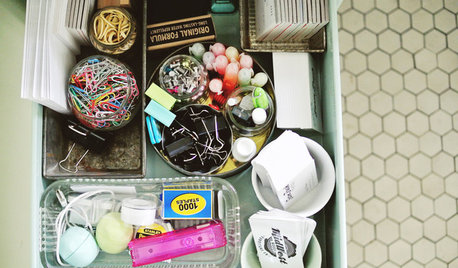Hey Shelly----
ooojen
18 years ago
Related Stories

DIY PROJECTSLight Up Your Night With an Easy Outdoor Table Lamp
Hit up Goodwill and the hardware store to make this lamp for a deck or poolside patio in minutes
Full Story
LIFE10 Ways to Cope With Grief During the Holidays
If you are experiencing loss, take it from an experienced griever — life has changed forever, but it does get better
Full Story
DIY PROJECTSHow to Fix Up a Thrifted Lamp
Save money and earn DIY cred by rewiring and snazzing up a damaged lamp you scored on the cheap
Full Story
HOME INNOVATIONSConsidering Renting to Vacationers? Read This First
More people are redesigning their homes for the short-term-rental boom. Here are 3 examples — and what to consider before joining in
Full Story
DIY PROJECTSTurn a Shipping Pallet Into a Stylish Ottoman
Get the step-by-step instructions for upholstering your own mod living room centerpiece
Full Story
DIY PROJECTSSalvage Style: A DIY Upholstery Project Makes a Grand Entrance
See how to turn a recycled coffee table into a stylish bench for your entryway
Full Story
REMODELING GUIDES6 Must-Know Lessons From a Serial Renovator
Get your remodel right the first time, with this insight from an architect who's been there too many times to count
Full Story
MOST POPULAR8 Ways to Get a Handle on the Junk Drawer
Don’t sweat the small stuff — give it a few drawers of its own, sorted by type or task
Full Story
MOST POPULAR11 Nominees for the ‘She Shed’ Hall of Fame
These special sanctuaries let busy women get away from it all without leaving the backyard
Full Story








ooojenOriginal Author
fishies
Related Professionals
Ashburn Landscape Architects & Landscape Designers · Middle Island Landscape Architects & Landscape Designers · Aurora Landscape Contractors · Mooresville Landscape Contractors · Concord Landscape Contractors · Berkeley Heights Landscape Contractors · Braintree Landscape Contractors · Bridgeview Landscape Contractors · Deer Park Landscape Contractors · Farmington Landscape Contractors · Framingham Landscape Contractors · Middleton Landscape Contractors · Wailuku Landscape Contractors · Waipahu Landscape Contractors · Lake Elsinore Interior Designers & DecoratorsooojenOriginal Author
fishies